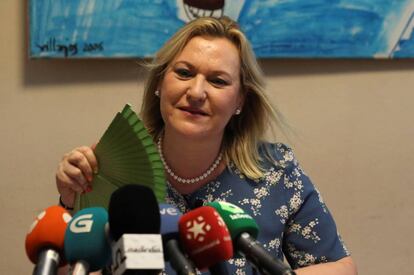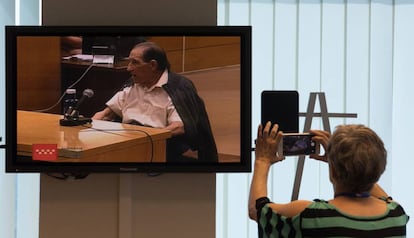First of Spain’s confirmed “stolen babies” finds family through DNA bank
Inés Madrigal, who was taken from her birth mother in 1969, has located a second cousin thanks to a US company, and says that she has “completed the puzzle that is my life”

The first woman to be recognized by the Spanish courts as one of the country’s so-called “stolen babies” revealed today that she has managed to locate her biological family after 32 years of searching. Thanks to a DNA database in the United States, Inés Madrigal has been put in touch with a second cousin, who informed her that her biological siblings were also searching for her.
At a press conference in Madrid today, Madrigal described finding her “true family” as a “triumph”
Over the last decade or so, it has emerged that during the dictatorship of Francisco Franco, a network of nuns and doctors at certain hospitals had taken babies from poor families or single mothers and given them to wealthy parents unable to conceive. The irregular scheme is thought to have been in operation until 1990, well after the death of Franco in 1975 and the return of democracy to Spain in the late 1970s.
In October last year, the Madrid Provincial Court found that Eduardo Vela, a retired doctor who is now 86, was the perpetrator of the three crimes of which he had been accused in Spain’s first “stolen baby” trial: child abduction, faking a birth, and falsifying childbirth records and other official documents relating to Madrigal. However, he was not given a prison sentence or any other kind of punishment on the basis that the statute of limitations on the offenses had expired.

At a press conference in Madrid today, Madrigal described finding her “true family” as a “triumph,” although the news for her is bittersweet as she has since discovered that her biological mother died in 2013 at the age of 73.
Madrigal was born in 1969 in Madrid’s Clínica San Ramón, but was given as a “gift” by Doctor Vela to her adoptive mother, Inés Pérez, who also died in 2013 in the midst of court proceedings over the adoption. During the court case, Pérez claimed that she didn’t pay anything for the child, and that the baby had been given up for adoption because she had been born to a married woman, and the father was not her husband.
The San Ramón clinic closed in 1982, and the registry of births from the hospital has not been found
The San Ramón clinic closed in 1982, and the registry of births from the hospital has not been found. During the trial, Vela claimed not to remember anything about the events.
Madrigal was told by her parents that she had been adopted when she was 18 years old. In 2010, her mother told her the truth behind the circumstances of her birth.
“For the first time, I have completed the puzzle that is my life,” Madrigal told reporters on Thursday, explaining that she had conveyed the information to the Madrid Provincial Court so that it can be passed on to the Supreme Court, which is studying an appeal against the sentence that acquitted Doctor Vela.
Since the scandal broke, some victims’ associations have estimated that there could be as many as 300,000 people affected. In 2012, after receiving a class action lawsuit from more than 250 families, the Attorney General’s Office summed up the supposed modus operandi of the network: “It consisted, essentially, in informing the mother and the family members of the newborn that the child had died. The hospital would offer to take care of the remains. That minor was then handed over to other people.”
It is currently unknown how many Spaniards have resorted to international DNA banks in a bid to find their families. But each success case brings hope to those who are looking for their origins.
These companies, which let their clients explore their ethnic origins and to build their family trees, crosscheck the genetic samples that they hold. The presence of such companies is not currently as large in Spain as it is in the Anglo-American markets. Victims of the Spanish network say that the best-known firms are MyHeritage and 23andMe, which analyze more genetic markers than Spanish laboratories, allowing for relationships of up to four degrees of separation to be identified.
English version by Simon Hunter.
Tu suscripción se está usando en otro dispositivo
¿Quieres añadir otro usuario a tu suscripción?
Si continúas leyendo en este dispositivo, no se podrá leer en el otro.
FlechaTu suscripción se está usando en otro dispositivo y solo puedes acceder a EL PAÍS desde un dispositivo a la vez.
Si quieres compartir tu cuenta, cambia tu suscripción a la modalidad Premium, así podrás añadir otro usuario. Cada uno accederá con su propia cuenta de email, lo que os permitirá personalizar vuestra experiencia en EL PAÍS.
¿Tienes una suscripción de empresa? Accede aquí para contratar más cuentas.
En el caso de no saber quién está usando tu cuenta, te recomendamos cambiar tu contraseña aquí.
Si decides continuar compartiendo tu cuenta, este mensaje se mostrará en tu dispositivo y en el de la otra persona que está usando tu cuenta de forma indefinida, afectando a tu experiencia de lectura. Puedes consultar aquí los términos y condiciones de la suscripción digital.








































